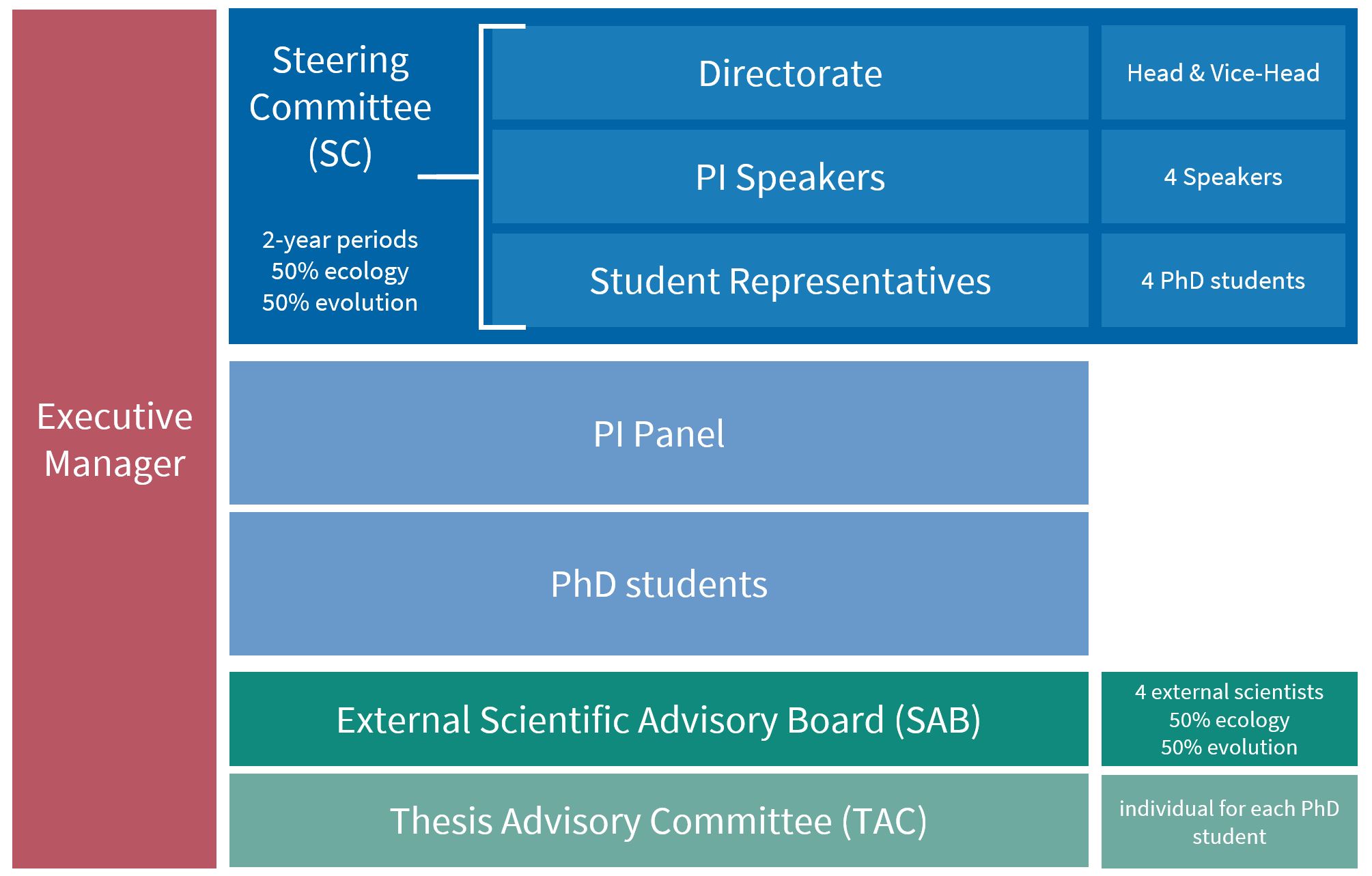Organisation of the Vienna Doctoral School of Ecology and Evolution (VDSEE)

- Directorate
consists of the Director and Vice-Director. The Directorate will be elected from the Principal Investigator Panel (PIP) for a period of two years with the possibility for another term of two years. Associated PIs from external institutions are also parts of the PIP but cannot take over administrative functions (i.e. Directorate and Steering Committee). The Director and the Vice-Director represent the two major fields of ecology and evolution respectively. Tasks of the Directorate include:
- To represent the VDSEE vis-à-vis the faculty, the faculty conference and the study conference, the rectorate and to the outside world (incl. public relations).
- To negotiate, oversee and manage the budget of the VDSEE.
- To convene and chair the meetings of the VDSEE’s bodies as outlined.
- To ensure that members of the VDSEE comply with the Code of Good Practice and the Rules of Governance.
- Steering Committee (SC)
consits of the Directorate and four additional PIs (50% ecology 50% evolution) and four Student Representatives. The PI SC members are elected by the PIP for a two-year term and may be re-elected for a further two-year term. The Student Representatives will be eleceted by the VDSEE student body and will serve a two-year term. The SC shall reflect the diversity of the Vienna Doctoral School of Ecology and Evolution.
The SC is responsible for administrative and management tasks, such as the admission of PhD students, the annual budget and its distribution, and the annual VDSEE report. Other duties and responsibilities include strategic decisions concerning the future development of the VDSEE, decisions on upcoming VDSEE events, the nomination and election of the SAB, conflict resolution and the appointment of juries. The SC meets at least twice per semester.
- Principal Investigator Panel (PIP)
consists of all Principal Investigators (PIs) who are members of the VDSEE. The PIs contribute to the teaching programme of the doctoral school and help organise retreats, symposia, etc. Tasks of the PIs include:
- To propose initiatives to the SC;
- To give feedback on the VDSEE's strategic plans as proposed by the SC;
- To nominate the Director and the Vice -Director;
- To propose and to elect the SAB;
- To elect the Steering Committee.
- Thesis Advisory Committee (TAC)
The Thesis Advisory Committee (TAC) functions as a review panel and also allows for any problems, scientific or otherwise, to be aired and discussed as appropriate. The TAC evaluates the PhD student’s progress and gives external advice to the PhD student and the supervisor(s). Moreover, the TAC offers formalized support, and a ‘protected space’ to resolve possible conflicts between PhD students, supervisors, and other research/training team members.
- Student Representatives
consist of four PhD students of the VDSEE (50% ecology 50% evolution) who are part of the steering committee and are elected by the PhD students of the VDSEE.
- PhD students
follow the rules of the Vienna Doctoral School of Ecology and Evolution, sign the Code of Good Practice for Doctoral Schools, register to the teaching units and actively participate in VDSEE activities, such as the annual, other symposia, seminar series, etc. (more details here).
- External Scientific Advisory Board (SAB)
consists of four renowned international scientists (50% ecology 50% evolution) that accompany the VDSEE for four years. The SAB advises the Directorate on management aspects and provides feedback on quality control, collaboration support and decision-making processes. The SAB visits the VDSEE every year at the annual retreat or Symposium.
- Executive Manager
assists the Directorate and supports all students. She is responsible for all management aspects, i.e. organisation of conferences, internal and external communication, budget management, organisation of calls and selection procedures, collection and survey of progress reports, preparation of reports to the SAB and Rectorate.
She is the first point of contact for PhD students in all technical, administrative or other questions in the context of the doctorate. She also ensures regular coordination with the administrative units within the university, e.g. the StudyServiceCenter and/or Center for Doctoral Studies.
Governance
We strive for consensus on all votes in all bodies. If this is not possible, a simple majority will be used for votes. In case of absences, body members are entitled to vote, others can be authorized to vote by proxy.
The Code of Good Practice for Doctoral Schools provides guidelines for good practice that are binding for all members of the Vienna Doctoral School of Ecology and Evolution. It includes the responsibilities of the directors, supervisors and as well as the responsibilities of doctoral candidates.
-
Pay attention to the rules of Good Scientific Practice! "Good scientific practice embraces all the procedures and practices that are necessary for planning, conducting and reporting research and scholarship within a framework of scientific integrity." European Science Foundation Policy Briefing 10 "Good Scientific Practice in Research and Scholarship", S. 5. Each Semester the Center for Doctoral Studies offers workshops on this topic. Visit the Workshop programme here.
